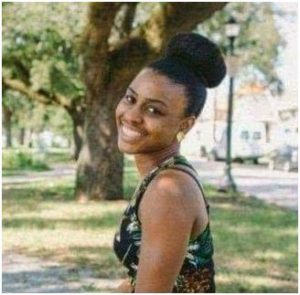By Quest R

In capitalist society, where we are surrounded by violence every day, many of us become desensitized. After years of never-ending police brutality and murder, some people have started to look at it like a permanent feature of reality that cannot be stopped.
This is not the case for Rodneka Shelbia, a brave New Orleans native who is now in a legal battle with NOPD and the criminal justice system. The New Orleans Workers Group along with a diverse array of community activists and organizations have been working with Rodneka for months to fight for justice in her case.
We interviewed Rodneka for Workers Voice to shed some light on this important local case in her own words. The following is based off of that interview:
Rodneka is from the Ninth and 13th Wards, and went to F.A. Douglas High. She graduated from Southern University and has worked at the Post Office for 6 years. She is also a singer and songwriter, “I write songs about my life, and what I witness,” she said.
In April, she noticed a scene of police brutality. Unfortunately since the case is ongoing in court, Rodneka cannot be quoted on the events of that night. From our investigation, it has been gathered that she saw an officer abusing a women who was holding a baby. She took the baby and screamed for the cop to stop and be human. When other officers came on the scene, the first cop pointed at her and told them to arrest her for battery. At the whim of one cop, Rodneka went from a courageous bystander who stepped in to protect a child to a victim of police violence herself.
Since that day, the legal system has put her through the works, as is the norm for the thousands of New Orleanians who pass through it every day. “Since then, I don’t feel safe in this system. I don’t trust the enforcers, the protectors, or any other beneficiaries of this justice system any more. Justice is at my expense and for the one who has been exposed,” she said.
Rodneka has refused to stand down, and many in the community have responded. “I’ve received love, time, money, hope, commitment, education, solidarity. In my case the community is diverse. There are others who are just numb. They don’t even know why I’m trippin’. They know I can’t win against the powers that be. I know I’m already winning. My community assures me that.”
She believes that her experience represents much more than an isolated incident “It represents why people revolt, buckle, and don’t fight back all in one. It represents slavery… I would like people to believe and know that they are worth a fight. Their humanity is worth a fight. And suppressing their humanity is not normal if they say its not.”
Rodneka has started the hash-tag #IWillNotBeDesensitized to spread awareness about her case, and to highlight how we cannot allow ourselves to accept inhumane mistreatment of ourselves or each other at the hands of police, regardless of how they try to normalize it. Check out the Justice for Rodneka Facebook page for more updates.
